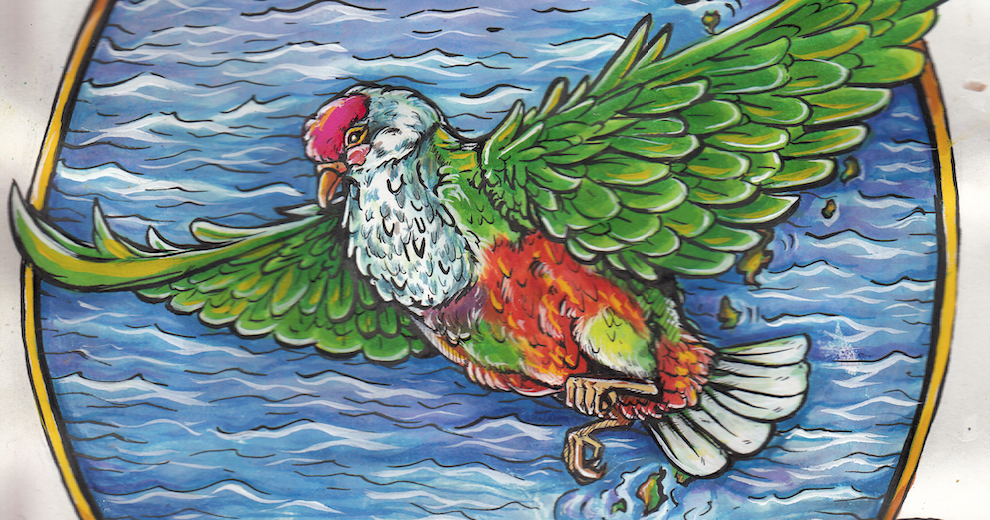Steven LeFever never forgot his roots, even after leaving Guam at 19 and eventually settling in Tokyo. More than a decade later, the CHamoru author, actor and filmmaker has channeled that connection into “Mariåna Sky,” a poetic adventure celebrating the culture and history of his homeland.
The book, launched on Amazon earlier this month, tells its story through the eyes of a sentient Mariåna fruit dove as it travels from Utak, the northernmost island in the archipelago, to Guåhan in the south.
“I don’t really care so much for tribalism,” LeFever said during a recent interview with The Guam Daily Post. “Even how people from the north on Guam, they talk crap about people from the south, and vice versa. I just think we’re all one. We’re all one island, and not just that. We’re even further than that. We’re deeper than that. We are connected as an archipelago.”
The project began more than a decade ago when LeFever returned to Guam for nine months after college. He had written a longer work in college but considered it practice. The idea for “Mariåna Sky” came to him as he lay in bed, thinking about having a totot (Mariana fruit dove) tell the story.
“I just like these ideas start stacking up together, coming together,” he said. “And I was like, what if, what if it starts at the northernmost Mariana Island and then the southernmost Mariana Island? This would be a chance for me to learn more about the islands.”
Born and raised in Nimitz Hill and Dededo, LeFever studied communications and acting in California before moving to Japan in 2012. He now works as a freelance actor and does sound recording and camera work. Throughout his time away, he has made efforts to stay connected to his CHamoru heritage.
“Now that I live in Japan, my roots are even in more danger of losing,” he said. “So, I always try to create ways to stay close to home, keep the roots strong and re-water the roots per se.”
The book weaves narrative fiction with researched history, touching on matrilineal leadership roles, traditional birth and funeral rituals, the sakman flying proa, CHamoru rice cultivation and values of inafa’maolek. It also explores modern issues including militarization and colonization.
“Ultimately, I wrote Mariåna Sky not just to tell a story, but to help preserve and revitalize ours,” LeFever said.
LeFever did not hold back on controversial topics, despite having friends and family in the military.
“I definitely don’t think Guam should be a military strategic point,” he said. “I definitely think it should be an independent nation. At least be … under free association to at least be more (a peer) toward America instead of being in America’s pocket.”
The author emphasized he does not want to shame military members but felt compelled to share a decolonization perspective, especially after attending FESPAC, where he encountered others with similar views.
“I didn’t realize how many people wanted this decolonization perspective until FestPac,” he said. “FestPac was really eye-opening where I saw that there were other people that had this idea of becoming independent.”
He added: “I just felt like this was something, a voice that needed to be said.”
Research for the book involved extensive use of Google Earth, Guampedia.com and conversations with friends who had visited islands LeFever had not been to himself. He made the story geographically accurate, including details about mountain heights, wildlife and the unique biological characteristics of each island.
“Some of the islands are like biological time capsules in which no feral animals have been introduced,” he said. “Whereas there are some islands where they have been introduced, and some islands where they’ve been cleaned up.”
The research process also provided an unexpected benefit.
“Sometimes writing can be lonely. This is why I like filmmaking, because it’s very collective,” he said. “But the research aspect was, it was OK. It was not bad because I got to reach out to some of my friends and hear what they had to say about things.”
Initially, LeFever tried working with UOG Press, but the lengthy review process led him to self-publish independently.
“I felt like it wasn’t ready for a long time, and I didn’t want to release it as it was,” he said. “And so, I just needed some time to grow, I guess, spiritually and philosophically and learn more.”
For young CHamoru readers, LeFever hopes his book shows “that the status quo doesn’t always have to be the status quo, that you can make a change if you believe in it.”
For military personnel and outsiders, he wants them to “respect the island first and foremost” and “learn about the history, not just like this is their land and they get to do what they want.”
At 40,000 words, LeFever is considering a second, extended edition that he said would reach the traditional 50,000-word novel length.
“I just want to say I’m very thankful for my friends and family who have already bought the book or are excited to get it and excited to read it,” he said.
While LeFever plans to focus primarily on filmmaking going forward, “Mariåna Sky” represents something deeply personal, an homage to his roots and a way to give back to the community that shaped him.
“It’s like one of those things you got to finish what you started,” he said. “I just felt like it’s something that hopefully my kids and my family can be proud that I just felt I could speak up about it.”
“Mariåna Sky” is available on Amazon at https://www.amazon.com/dp/B0FJDD563V.


AloJapan.com